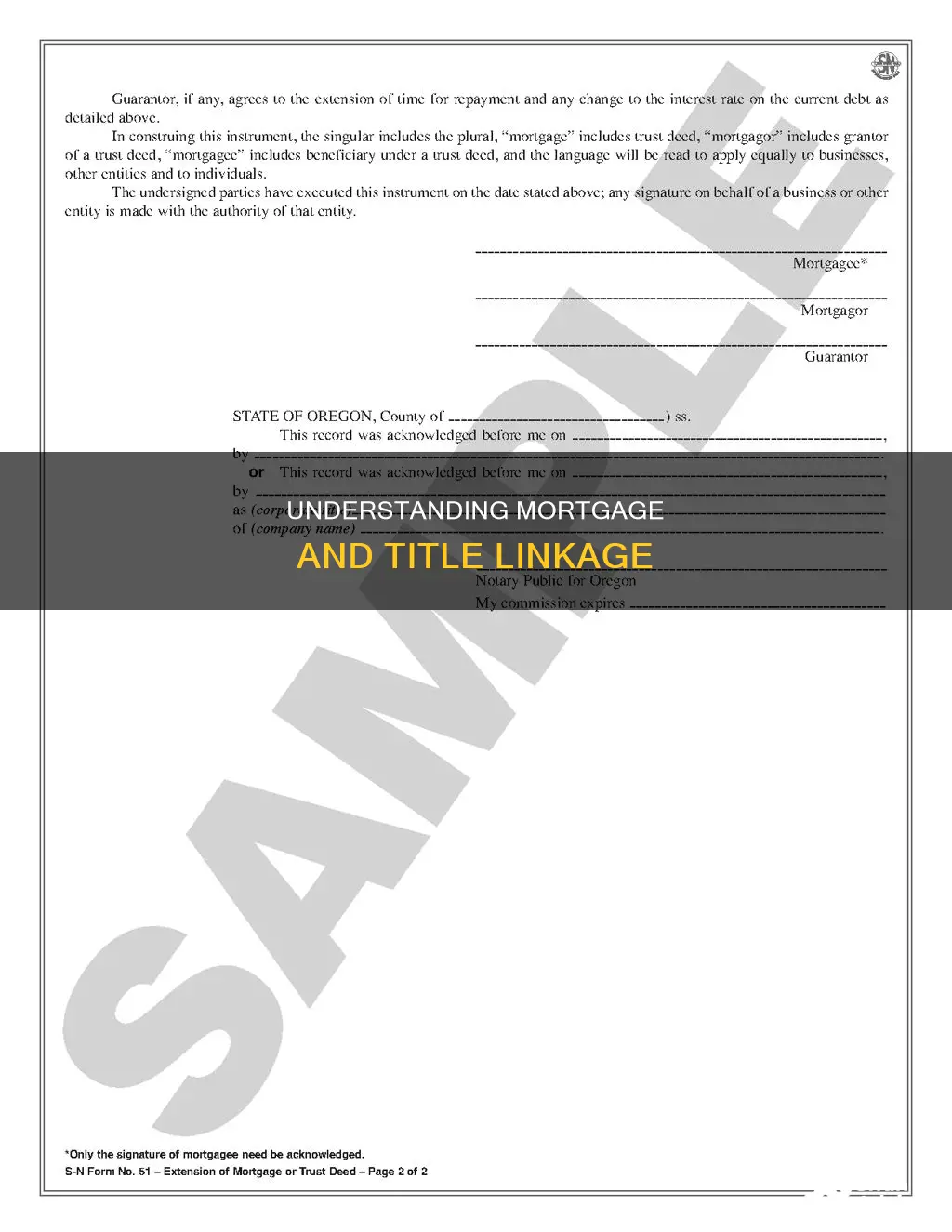
When buying a home, a property title search is a critical measure to ensure the absence of any contested claims on who owns the property. A house title is a legal concept that grants property owners their ownership rights, and a title search is the process of examining public records to determine and confirm a property's legal ownership. This process is usually carried out by a title company or attorney, and it involves researching various legal documents to establish a chain of title and confirm that the seller is the rightful owner. A mortgage lender will require a title search and a lender's title insurance policy to protect them financially against any claims against the home's title. The buyer typically pays these fees as part of their closing costs, and it is important to understand who truly owns the home to protect against financially ruinous title disasters.
| Characteristics | Values |
|---|---|
| What is a house title? | The legal documentation that grants property owners their ownership rights |
| What does a house title represent? | All the legal rights surrounding the ownership and use of a residential property |
| What is a title search? | Research of public records to determine a property's legal ownership and find out what claims are on the property |
| Who conducts a title search? | Normally conducted by title companies, but can also be done by individuals and businesses |
| Who requires a title search? | Mortgage lenders require a title search as part of the mortgage underwriting process |
| What is the purpose of a title search? | To determine whether there is a clean title on a piece of property or whether there are liens or other defects, such as public record errors, which prevent it from being transferred between parties |
| What is the outcome of a title search? | A clean title is required for any real estate transaction to be completed |
| What is the outcome of a title search with liens? | Transactions cannot be completed if a title search determines there is a lien on the property |
| What is the role of a title company? | A neutral third party hired by the buyer (typically through the lender) to research and insure the title of the home being purchased |
| What is the role of a title company at closing? | The title company will prepare or help obtain the documents necessary to complete the purchase |
| What is the role of a title company post-closing? | The title company will also issue title insurance to protect the buyer from any liability |
What You'll Learn

Title searches
A title search is a crucial part of the home-buying process. It involves examining public records to determine a property's legal ownership and uncover any claims or liens against the property that may affect its purchase. This process is typically conducted by a title company or an attorney on behalf of a prospective buyer before making an offer on the property. It can also be initiated by a lender to verify property ownership and ensure no claims or judgments against the property exist before approving a loan.
When you buy a home, you want to ensure that no one but you and your lender has a claim to the property. A title search helps mitigate the risk of claims on a property's title by uncovering any issues, such as unknown liens, public record errors, or unresolved building code violations. It also reveals any encumbrances, such as unpaid property taxes, homeowners association (HOA) fees, or unpaid bills for previous home improvements, which could become the responsibility of the new owner.
In summary, a title search is an essential step in the home-buying process, providing confidence in the legal ownership of the property and ensuring no hidden claims or liens exist. By combining it with title insurance, buyers and lenders can protect their investment and mitigate potential risks associated with the property's title.
Understanding Mortgage Increases: Factors Behind Rising Payments
You may want to see also

Title insurance
A house title is the legal documentation that grants property owners their ownership rights. It is not a document, but a concept used to establish a property owner's "bundle of rights". When you buy a home, you become the legal owner of the property.
A title search is a crucial part of the home-buying process. It is an examination of public records to determine and confirm a property's legal ownership and find out what claims are on the property. It is usually performed by a title company or an attorney on behalf of a prospective buyer. A clean title is required for any real estate transaction to be completed. A title company or attorney typically takes care of the title search, but in some cases, a lender or home buyer may conduct the search.
Understanding Mortgage Company's Evaluation Process for Loan Limits
You may want to see also

Title companies
During the title search, title companies look for any outstanding mortgages, liens, judgments, or unpaid taxes associated with the property. They also identify any restrictions, easements, leases, or other issues that could impact the ownership. For example, a previous owner's debts, such as unpaid property taxes, homeowners association (HOA) fees, or unpaid bills for previous home improvements, can become the responsibility of the new owner if not addressed before the sale. Therefore, the title company's due diligence is essential to protecting the buyer's interests.
In addition to conducting title searches, title companies also issue title insurance policies. There are two main types of title insurance: owner's title insurance and lender's title insurance. Owner's title insurance protects the property owner from any title issues that may arise, while lender's title insurance safeguards the mortgage company. Buyers typically pay for the lender's title insurance as part of their closing costs, and it is recommended to also obtain an owner's title insurance policy for added protection.
While working with a title company is not required by law, most mortgage lenders mandate it as a condition of issuing the loan. Engaging the services of a title company provides peace of mind to buyers, as they review all documents and facilitate a secure transfer of funds, ensuring a proper transfer of title. Therefore, title companies play an indispensable role in mitigating risks and safeguarding the interests of all parties involved in the real estate transaction.
Retirement Savings: Easier Mortgage Approval with a 401k
You may want to see also

Title defects
A "defective title" refers to an impaired title on a piece of property or other assets. The defect or impairment on the title can be in the form of a lien, mortgage, judgment, or other types of encumbrances. Because other parties can lay claim to the property or asset, the title cannot be legally transferred to someone else. Defective titles are also called "bad titles" and are considered "unmarketable". This means that the asset in question cannot be transferred or sold legally until the defect is fixed.
Some of the most common title defects include:
- Undisclosed second mortgages: These are the most common type of title defect. Undisclosed second mortgages are bound to show up on a title search, disrupting the transaction.
- Unreleased mortgages: These are mortgages that have yet to be officially discharged or released from property records even though the underlying debt has been repaid. When a homeowner pays off their mortgage, the lender is responsible for filing the necessary documents to release the mortgage lien from the property. If this release is not recorded correctly, it can create a cloud on the title, impacting the property’s marketability.
- Missing heirs or undisclosed parties with a legal interest in the property: Title defects might arise if there are missing heirs or undisclosed parties with a legal interest in the property.
Missouri Mortgage Recording: A Step-by-Step Guide
You may want to see also

Title deeds
There are several types of title deeds, each serving a different purpose and offering varying levels of protection for the buyer. The most common type of deed is the general warranty deed, which guarantees that the seller owns the property and that there are no outstanding mortgages, liens, or other claims against the property. This type of deed also provides the most protection for the buyer, as it ensures that the seller is unaware of any future property issues. In the event of a dispute, the seller must defend the title for the buyer. A specific warranty deed is similar but only warrants that the seller did not encumber the property while they owned it.
Special warranty deeds are typically used for commercial property purchases and guarantee title only during the time the seller owned the property. Quitclaim deeds are often used for transfers between family members or legal entities without money changing hands. They do not provide the same level of protection as a conventional deed, but they can be used to quickly resolve a title dispute or error.
Before purchasing a property, it is essential to conduct a title search to determine the legal ownership and find out if there are any claims or liens on the property. This process is usually performed by a title company or attorney and involves researching public records, deeds, tax liens, land records, and court judgments. A clean title is required for any real estate transaction to be completed. Title insurance can also be purchased to protect against unknown property issues or encumbrances.
Valuing Mortgage Servicing Rights: What You Need to Know
You may want to see also
Frequently asked questions
A house title is the legal documentation that grants property owners their ownership rights. It is not a document, but a concept used to establish a property owner's "bundle of rights".
A title search is research into public records to determine a property's legal ownership and find out what claims are on the property. It is a key part of the home-buying process.
A title company is a neutral third party hired by the buyer (usually through the lender) to research and insure the title of the home they are buying. They also manage the closing of the home, reviewing titles to identify issues that could affect the purchase.
A house title proves ownership of a property. A mortgage is a specific type of financial loan used to buy a home. It is possible to have a name on a title but not on the mortgage, or vice versa.







